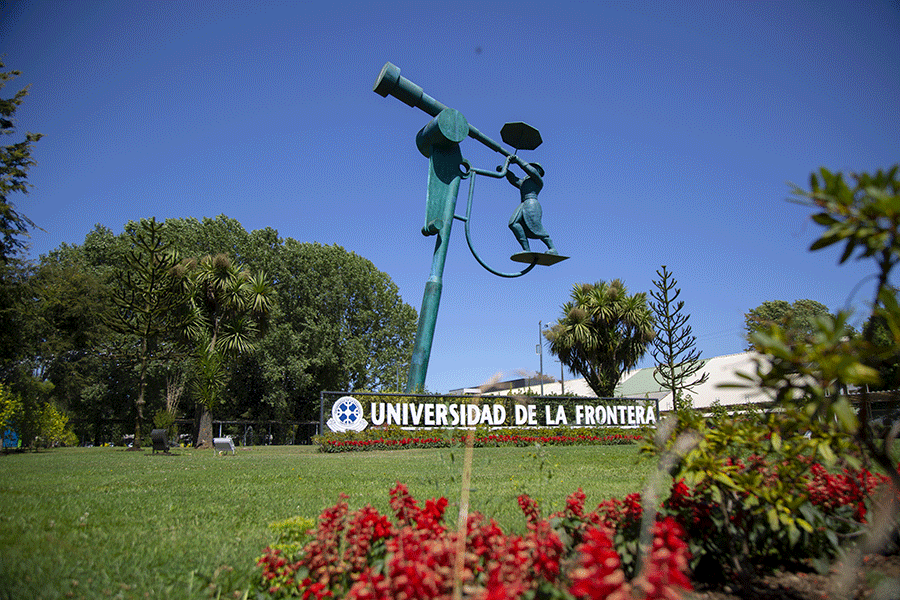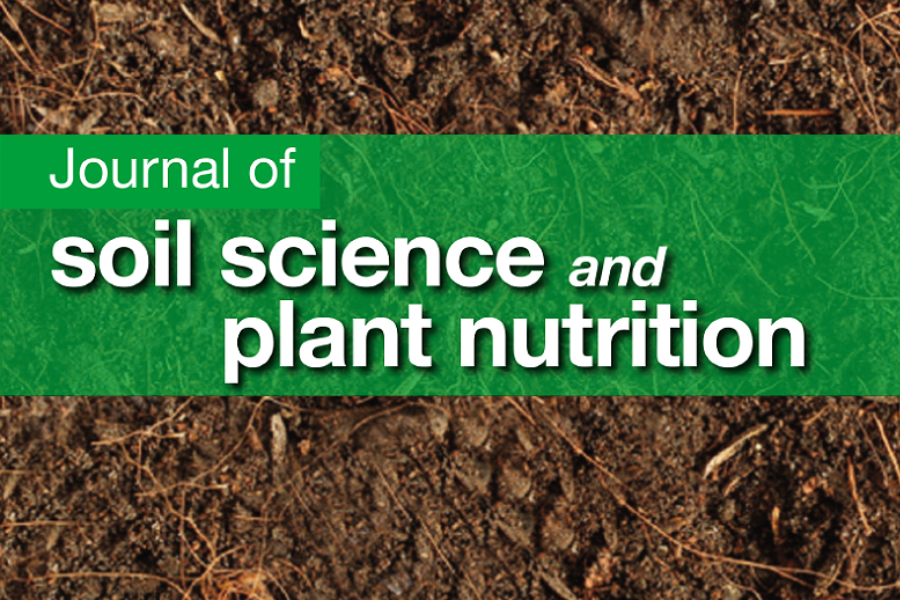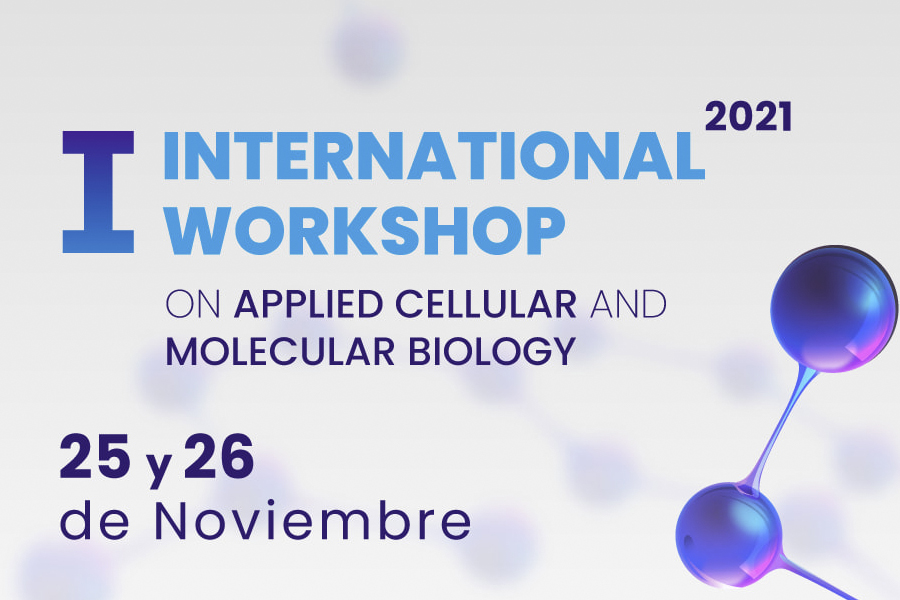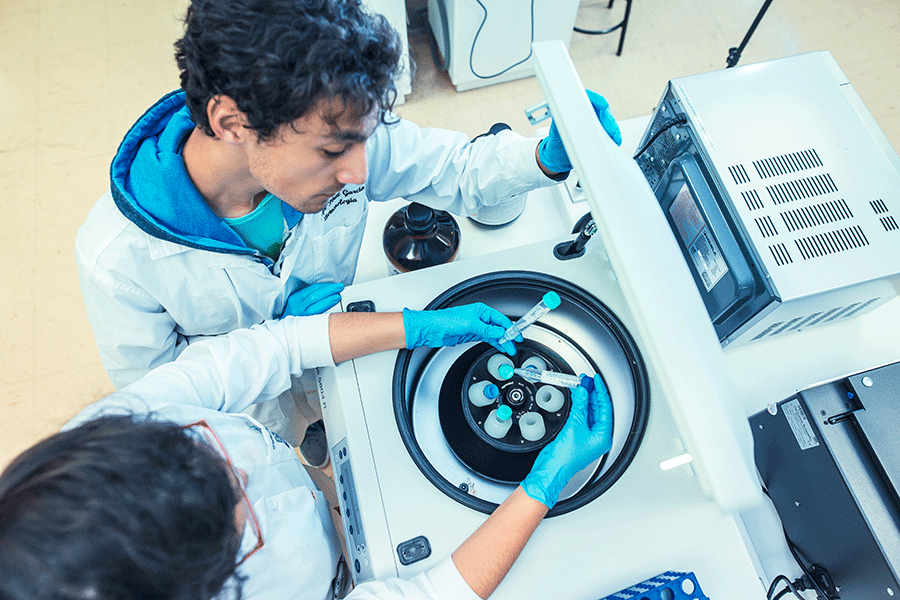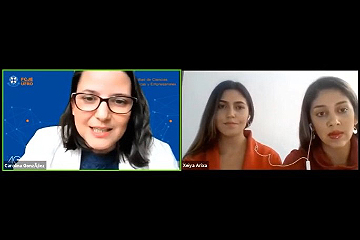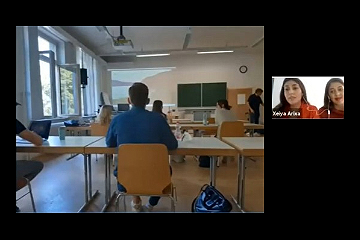|
This Ranking analyses the performance of the universities in Chile. UFRO is ranked fifth overall, and fourth in the category “Innovation and Technology Transfer”. |
The Universidad de La Frontera (UFRO) once again achieved to be in the group of Chilean universities with the best performance in the fields of research, development and innovation, standing out for its productive capacity, impact, quality, technologies and innovation. The second Ranking R&D&I 2021, led by the advanced study group Universitas, analyzed the performance of the different universities of the Chilean university system regarding their development of scientific production, in which UFRO is ranked in fifth place. One of the explanations for this great position is the high level regarding scientific production, thanks to the researchers of UFRO, who recently had to overcome great challenges, due to the global health crisis. Another relevant factor that allowed UFRO to stand out among the universities is the quality and impact of the international publications (which are more than 800 annually) developed by the research teams that contributed in more than 200 fields of knowledge with their research. FOURTH BEST IN CHILE IN INNOVATION AND TECHNOLOGY TRANSFER The democratization of knowledge is one of the main axes of UFRO, and the Vice-rectorate for Research and Graduate Studies puts a strong emphasis on efficient scientific transfer and a strong link between state, business and university. The work developed by the Office of Innovation and Technology Transfer plays an important role in that relationship and is reflected in this great result. The director, Franklin Valdebenito, commented that these results in the field he directs make him “very proud, since it puts UFRO in a very select group of universities in Chile. At the same time, it is a great motivation to keep working in order to make our research results visible to the whole community and in order to be an important and concrete contribution for society. Innovation occurs when we develop science with an impact – that is our goal and what we focus on, when it comes to Innovation at UFRO”.
Written by: UFRO Communications Office |
|
Dr. María de la Luz Mora Gil, the director of BIOREN-UFRO, is the editor-in-chief of the Journal of Soil Science and Plant Nutrition, which increased citations from 1,440 in 2018 to 3,256 in 2020. |
Web of Science (WOS) informed that the Journal of Soil Science and Plant Nutrition (JSSPN), which is edited by the Universidad de La Frontera (UFRO) and the Chilean Society of Soil Science, reached an Impact Factor of 3.872, an indicator that positions it in the group of top scientific journals with the highest impact in the world and in the field of plant sciences, soil sciences and environmental sciences. This is a milestone for UFRO and a great achievement for Chile. The Journal Citation Report (JCR) of WOS, provided by Clarivate Analytics, allows obtaining comparable statistical data of citations, including the Impact Factor, which systematically and objectively determines the relative importance of the world's leading scientific journals according to their respective thematic categories. In its fields of expertise, JSSPN is positioned in first quartile (Q1) in Plant Sciences and in second quartile (Q2) in Soil Science and Environmental Sciences. At the national level, JSSPN maintains the deserved and meritorious second place among all journals published in Chile, and first in the field of Soil and Environmental Sciences. It is remarkable that the two best-positioned Chilean journals significantly increased their impact factor during the pandemic. THE JOURNAL AND ITS HISTORY The journal was created as an initiative for scientific dissemination in Chile, impulsed by the outstanding academic and researcher Dr. Achim Ellies of the university Universidad Austral de Chile. When he died in 2005, the Chilean Society of Soil Science entrusted Dr. María de la Luz Mora Gil, a highly estimated academic and researcher of UFRO, with the responsibility of directing and promoting this scientific project. In 2008, the internationalization process for the journal began by being indexed in Thomson Reuters (currently WOS Clarivate), thanks to its alliance with the SciELO publishing house, the support of national and international collaborators and the different projects funded by the National Agency for Research and Development (ANID). In 2018, an agreement was signed with the global publisher Springer Nature, so that the journal started to be published by this huge and renowned international publisher since 2019. This was a fundamental and strategic step, since it gives the managing entities, in this case the Chilean Society of Soil Science and the Universidad de La Frontera, a greater visualization and international reputation. Consequently, the number of citations more than doubled from 1,440 citations in 2018 to 3,256 citations in 2020. After joining Springer, the Impact Factor of the journal JSSPN fluctuated around 2 points without major variations for a couple of years. Now, after a long period of hard work carried out by the editors and reviewers, and a long-term strategy, the journal has an Impact Factor of 3.872. This figure is highly relevant, since it places JSSPN in the first quartile (Q1) in the field of Plant Sciences, a segment reserved for the most important scientific journals in the world. This converts JSSPN into an important reference for researchers and scientists from all over the world. Dr. María de la Luz Mora Gil, the editor-in-chief, comments that “we are very proud to see how the journal has grown over the last ten years, especially considering that the management is based at the Universidad de La Frontera, with outstanding and very hard working collaborators who dedicated many hours to this project. Some of them are Dr. Alex Seguel, Dr. Fernanda Cid and an entire editorial team led by Dr. Patricio Barra. We are very happy, because we are convinced that this is a tremendous achievement for the Universidad de la Frontera and for the entire country. This has been possible thanks to the hard work of many people – a lot of them graduates of the Doctorate in Natural Resource Sciences of UFRO – who have made available all their skills and knowledge in order to reach our goals”. One of the strategies to achieve a constant growth of the journal is to have a team of internationally recognized collaborators in the Editorial Committee, such as Dr. Nanthi Bolan (University of Newcastle, Australia), Dr. Leo Condron (Lincoln University, New Zealand), Dr. Petra Marschner (University of Adelaide, Australia), Dr. Miroslav Nikolic (University of Belgrade, Serbia), Dr. Maria A Rao (Università di Napoli Federico II, Italy), Dr. Alan Richardson (CSIRO Plant Industry, Australia) and Dr. Cornelia Rumpel (French National Centre for Scientific Research, France). “These internationally renowned Associate Editors are actively participating in the reviewing and editing process of our journal,” explains Dr. Mora. Regarding the quality of the contents, Dr. María de la Luz Mora Gil points out that “we are very strict when it comes to the selection of articles for our journal, because we are looking for novel and excellent papers of quality, with high impact. Of about 1500 papers we receive over the year, we publish about 20%. That requires meticulous work, which is carried out by our team of collaborators and editors”. According to Dr. María de la Luz Mora Gil, this remarkable achievement motivates the team to keep working and developing their strategies. “In a competitive world like ours, it is not easy to maintain our standards – that is our main task, and the second one is to enter the first quartile (Q1) in the fields of Soil Science and Environmental Sciences. Actually, we are already working on that, for example through Special Editions,” she concludes. Written by: Andrea Poblete Pacheco |
|
The event is organized by the Doctoral Program in Sciences with specialization in Applied Cellular and Molecular Biology of the Universidad de La Frontera and will take place online, on November 25 and 26. |
Experts and students from different countries will be part of the first International Workshop on Applied Cellular and Molecular Biology, which will take place online on November 25 and 26. The workshop is organized by the Doctoral Program in Sciences with specialization in Applied Cellular and Molecular Biology of the Universidad de La Frontera (UFRO) and is open to everybody who is interested, from the students of the Program itself, to other national and international participants. The workshop consists of different symposia that will address four main topics: Biotechnology of bioresources, Cellular and Molecular Biology of Reproduction, Cellular and Molecular Biology of Priority Diseases, and Applied Science: the challenge of linking academy and industry. “This is the first time that the Doctoral Program organized a workshop individually. It will be a valuable opportunity to present our lines of research and the academic body, and to strengthen ties with the graduate community,” says Dr. Marjorie Reyes Díaz, who is part of the academic body of the Program and in charge of organizing the workshop together with Dr. Cledir Rodríguez Santos. The connection with the graduates of the Doctoral Program actually is one of the focuses of the event, which will be addressed in the symposium “Applied Science: the challenge of linking academy and industry”, where the main guests are graduates of the program who are currently strongly linked with the industry. The registration deadline for the Workshop is from October 12 to November 20. The deadline for abstract submission is from October 12 to October 31, and the deadline for poster submission is November 12. For more information, registration or the download of the abstract guidelines, please visit: http://doctoradobiomol.ufro.cl/index.php/i-international-workshop.
Written by: Doctoral Program in Sciences with specialization in Applied Cellular and Molecular Biology, UFRO
|
|
Two of the three Business Engineering students of UFRO, who received the DHBW-Ravensburg Scholarship, shared their international mobility experiences with their peers and gave useful advice to motivate other students to participate in this kind of programs. |
The future Business Engineers of the Universidad de La Frontera (UFRO), Pamela Vera Loncomilla, Xeiya Abarzúa Cifuentes and Daniela Henríquez Cruces were awarded a scholarship by the German University Duale Hochschule Baden-Württemberg (DHBW) and started their international student mobility experience in July.
|
|
Teams of future engineers of both universities are working on different projects to find business-oriented solutions. |
The health emergency has led to a series of challenges for society in general and made it necessary to adapt both training and production processes. Digital technologies have become key in the teaching-learning process, since they allow that national and international educational initiatives and programs continue. In this context, students from the Faculty of Engineering and Sciences of the Universidad de La Frontera (UFRO) in Chile and the Faculty of Design and Creative Technologies of the Auckland University of Technology (AUT) in New Zealand are participating in the program “Projects with Industry”. This initiative seeks to strengthen the connection between students of both universities and, at the same time, to solve real problems of the industry through initiatives designed collaboratively. Under the guidance of academics from both universities, the future engineers are developing solutions for Everis and WorkSafe New Zealand (WSNZ, the primary Health and Safety regulator in New Zealand) through two initiatives: “The Enigma Project” (with four AUT-students and one UFRO-student of the program in Computer Engineering) and “The Inspector Game” (with four young AUT-students and two UFRO-students). “WorkSafe New Zealand is the primary Health and Safety regulator in the country, which promotes the education about Health and Safety practices at the workplace,” explained Samaneh Madanian, the Program Advisor for Master of IT Project Management at AUT and guide for the students of the project “The Inspector Game”. “The goal of this project is to develop a digital platform that addresses the need to improve the skills of WorkSafe employees with an innovative platform that helps them to improve their skills by identifying health and safety risks at the workplace. WorkSafe will identify the training areas and manage the content of the application. That will allow a collaborative partnership and train competent and confident health and safety inspectors within the company,” she explained. According to Madanian, the main difficulty was the time difference between Chile and New Zealand, but the team mastered that challenge by using an online sharing platform, which adapted to the needs of the students from both universities. “One of the main advantages for the students in this kind of projects is that they gain experience working with international project teams. Most likely, that is exactly what they will have to do at their future workplace, too,” Samaneh Madanian said. “The students learn more independently how to deal with different challenges and how to plan a project taking into account the needs and requirements of the team members, as for example different languages and time zones. In addition, the project taught the students how to use digital solutions to mitigate some of the project risks,” she added. INTERNATIONAL EXPERIENCE According to Maya Ashizumi-Munn, who is a student from New Zealand and part of the “WorkSafe New Zealand” project, the experience of working with an international team is priceless. “We have learned a lot about how to manage a complex project with multiple teams involved. We had to adjust deadlines and to adapt to the work schedule together with the team of UFRO. It was a great challenge, however, that is how it is usually done in the industry, working together with many different teams, and I am happy that I had the chance to participate in this great learning experience,” she explained. According to Aryaman Chauhan, who is a student from New Zealand and part of the “The Enigma Project”, the international partnership between the two universities provides great opportunities for both future engineers and graduates from New Zealand and Chile. “These kind of programs give us the opportunity to improve our cultural awareness and to learn how universities work in other countries. Besides, the ability to analyze, discuss and share experiences is crucial for educational processes. Probably, the main objective of this collaborative project is the preparation it provides for professional life, since it helps us to understand how different countries operate, what might lead to better international job opportunities”, he said. Meanwhile, Susana Candia, the director of the Internationalization Node of the consortium at UFRO, explained that “it is important to promote this kind of projects, both for the international partnerships with companies in the region, achieved by the faculty, as well as for the development of the students’ global competencies by solving real problems. We hope to be able to incorporate other fields and programs in the future, in order to increase the number of companies that are part of the projects”. Currently, both projects are in the process of presenting their progress and first results, while two other projects, in which another seven students of the Faculty of Engineering and Science of UFRO will participate, are already planned. Written by: Mauricio Antivil
|





